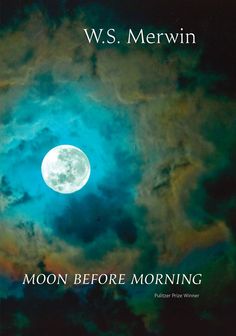Moon Before Morning
by W. S. Merwin
reviewed by Jason Tandon
W. S. Merwin’s latest poetry collection, Moon Before Morning, has an essentially Romantic theme: one can achieve a state of spiritual wholeness and emotional contentment by communing with the rhythms and phenomena of the natural world.
In a few fields the first hay is lying
naked in its new fragrance as its color fades
and no one has stayed to see the noon light
dappling the small growth in the shade of the trees
(“Time in the Grass”)
For Merwin, the ideal mode of living (and of writing poems) is in the “unrepeatable present,” a present “offered only once / without a word except the one / sound of hushing.” Achieving harmony between body and mind, however, is not a simple task. The divide is great, according to Merwin, and the process demands sacrifice and commitment:
The sky said I am watching
to see what you
can make out of nothing[ . . . ]
I am giving you a chance
I was looking up and I said
I am the only chance I have
then the sky did not answer
and here we are
with our names for the days
the vast days that do not listen to us
(“How It Happens”)
While most of these poems are set in the natural world, some do criticize the practices and institutions of our consumer culture. “Saturday morning and the trades / are back trading out of the east / offering their samples of cloud / each the only one of its kind,” begins the poem “Offering,” the play on “trading” suggestive of Wall Street’s abusive and deceptive practices. The speaker in “Urticophelia” laments the predilection for advertising, expansion, and empty rhetoric.
Oh let the world’s sense
come to me from the spring leaves of nettles
my true elders and not from the voices
with something to sell nor from the spreading
scar tissue of pavement numbing the flayed earth
not from the latest words of the fast-talkers
to whom the nettle leaves never listen.
Merwin’s central impulse as a poet, though, is not that of the critic but of the naturalist: walking, observing, touching, recording. The best poems in this collection relay particulars, persuasively and pleasurably, allowing the images to suggest figurative meanings. When the poems privilege abstraction over particulars, on the other hand, or when there is a stark imbalance between the two, they become less engaging.
As though it had always been forbidden to remember
each of us grew up
knowing nothing about the beginningbut in time there came from that forgetting
names representing a truth of their own
and we went on repeating them
until they too began not to be remembered
they became part of the forgetting[ . . . ]
though we always forgot where they came from
and forgot that it was forbidden
and whether it had been forbidden
(“The Beginners”)
Merwin has spent the better part of his eighty-five years living in remote locations—the last thirty-five on the island of Maui—dedicated to environmental causes. Merwin’s life has been one of withdrawal, moderation, and quietude, and Moon Before Morning illustrates his fervent belief in nature’s restorative power: “Rain through the morning / and in the long pool a toad singing / happiness old as water.”
Published on February 12, 2015

